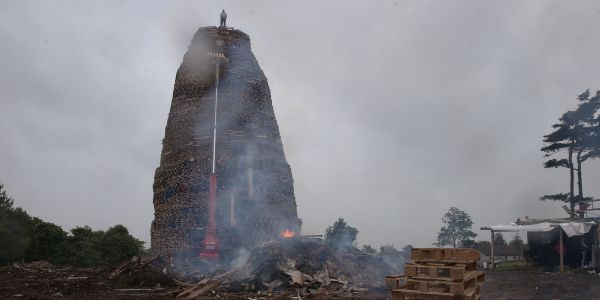The Government has urged more effective dialogue around bonfires.
A Belfast pensioner and a family were left homeless after embers from an Eleventh night blaze near the Shankill Road set fire to a row of terraced houses.
Foreign Affairs Minister Charlie Flanagan said: “This, together with burning of flags and election posters at certain bonfires, as well as the environmental damage caused by burning tyres, is a reminder of the need for effective dialogue around bonfires – so that this important cultural expression can be enjoyed by all.”
Mr Flanagan said a new commission on identity and tradition established as part of Stormont’s Fresh Start Agreement should consider the issue.
A senior police officer has defended his force’s handling of a practice lauded by some as cultural expression but condemned by others as sectarian.
Police Service of Northern Ireland assistant chief constable Stephen Martin responded to criticism that the organisation failed to act against potential law breakers and called f or a collective approach to tackling the annual problem.
He said: “The best way to improve the situation is through consultation; through dialogue and through partnership between the police, the other agencies, political and civic leaders and, critically, communities must be at the heart of this.”
More than 300 bonfires were lit on Monday night, kick-starting the annual Twelfth of July celebrations.
Two terraced houses in the Shankill area of west Belfast were destroyed and another was badly damaged after embers blew on to the roofs, causing a fire.
There was also controversy around the burning of tyres, election posters and Irish tricolours while the height and location of some of the towering structures caused outrage in some areas, with at least one bonfire being built close to a new children’s play park in east Belfast.
Mr Martin, who has responsibility for overseeing operations around bonfires and parading, added: “I am required in law to consider the necessity and proportionality of my actions.
“Often I take a view that enforcement action is not proportionate in the circumstances, albeit I fully recognise that is what some people would want.
“Police deal with crimes and some of the crimes involved would be extremely difficult to prove.
“For example, whilst putting an election poster on a bonfire might be very distressful to the person whose image is on it, and the political party involved might hold very strong feelings about it, the offence in reality is likely to be the theft of a piece of paper.
“In considering enforcement action, I have to think about the consequences of police action.
“I have to balance the benefits of recovering the poster to prove an offence of theft that would be very difficult to identify someone for, against the risk that police intervening would create increased tension and risk of disorder and then correspondingly the increased risk of police having to use force to quell that disorder.
“Added to that, the law around hate crimes and incidents in Northern Ireland differs from other UK regions.
“The hate element must accompany a specific substantive criminal offence for example theft or criminal damage.
“The PSNI is on record as calling for a discussion on the need for specific hate crime legislation in Northern Ireland.
“I can assure the public that we take all hate incidents and crimes extremely seriously and will ensure they are investigated appropriately.”
